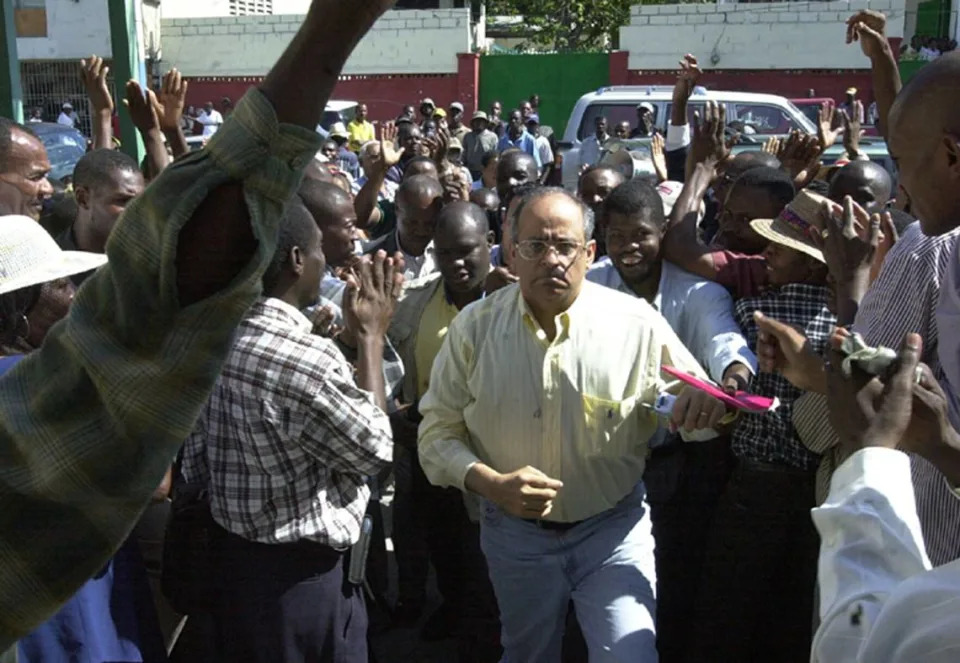Jacqueline Charles
Tue, June 27, 2023

DANIEL MOREL/AP
A prominent Haitian power broker says a decision by Canada to impose sanctions on him “is a serious blow” to his efforts to help bring jobs and social development to one of Haiti’s more neglected regions.
Andre “Andy” Apaid also said it’s incomprehensible that he would be placed “on a list of sanctioned individuals accused of ‘human rights violations, including sexual violence.’ ”
“I categorically reject all accusations and suspicions of contributing to the climate of insecurity or corruption,” Apaid said, asking Canadian Foreign Minister Mélanie Joly to “verify her sources and the facts.”
Last week, while attending the General Assembly of the Organization of American States in Washington, Joly announced that Ottawa had imposed sanctions against Apaid and three well-known gang leaders, two of whom were involved in the abductions of 17 American and Canadian Christian missionaries in the fall of 2021. As with previous sanctions, she did not give specifics on why the people were blacklisted. The sanctions bans an individual from traveling to Canada and freezes any assets one may hold in the country.
Haitian banks, fearful of losing correspondent banking relationships with U.S. and Canadian banks, have responded to sanctions by closing accounts, making it difficult for individuals to do business in Haiti.
READ MORE: How U.S. sanctions turn people into ‘economic pariahs’ and why some call it a civil death
Apaid, a U.S. citizen who has enjoyed both warm and contentious relations with various Haitian leaders over the years, said the decision by Canada has serious repercussions on his business dealings, including an ambitious agricultural project he’s launching in Haiti’s Central Plateau region with foreign partners.
“I am a dedicated Haitian-American citizen who strongly supports a peaceful resolution to the serious crisis our country is facing. This is well known among political and civil society members,” he said.
Apaid is the latest member of Haiti’s business and political elite to push back on the sanctions designations, which so far have been issued by Canada, the United States and the Dominican Republic after the United Nations last year voted unanimously to clamp down on illicit arms sales and violent criminal armed groups in Haiti.
The U.N., which sanctioned former cop-turned-gang leader Jimmy Chérizier, has a team investigating who it will add to its list, including individuals already blacklisted by other foreign governments. The European Union is also expected to begin issuing sanctions soon.
While the sanctions policies have elicited fear in Haiti, they have also raised questions about how far foreign governments are willing to go to target members of Haitian society and where are they willing to draw the line in a country where businesses have survived because of extortion payments and ties to gangs. Questions have also been raised about how countries choose who they sanction.
For example, a sanctions list put out by the Dominican Republic is controversial because of who is included and who is not, and privately some diplomats don’t give it much credence.
In the case of Canada, the lack of details about what individuals are accused of, has raised concerns in diplomatic circles. The Canadian government has been asked to provide more details but so far has rejected the request.
Instead, Ottawa has criticized other countries, including the United States, for not following its aggressive approach to target individuals involved in corruption and fanning instability in Haiti.
U.S. State Department officials, who have been criticized for the lack of business people on the American list, have said they remain committed to issuing tough financial sanctions.
A longtime industrialist, Apaid rose to prominence in the early 2000s as the leader of the civil society organization known as Group 184, which launched a social movement and organized in opposition to Jean-Bertrand Aristide when he was president.
In a press statement, Apaid said that with the exception of current Canadian ambassador to Haiti, Sébastien Carrière, whom he has not met, “almost all of Canada’s ambassadors since 2004…have witnessed my efforts and contributions” to persuade gangs to disarm.
“As a team, including human rights advocates, religious leaders, and credible and courageous individuals from civil society, we have made four attempts to persuade gangs to participate in a disarmament process,” he said.
As a businessman, Apaid said, he has worked tirelessly to create tens of thousands of jobs in Haiti despite the challenges. He and his family, which operates a factory, adhere “to a strict and courageous policy” of not providing money or goods to armed groups, he said. “This commitment came with enormous risks for our collaborators and my sons.”
Apaid is currently involved in a major agricultural project in the Central Plateau to benefit farmers and inhabitants of the region. It is being carried out on land belonging to the Déjoie family that was confiscated in 1957 and handed over to the Haitian government. Under a deal with former President Jovenel Moïse, Apaid now has control of the land and says his project will create more than 20,000 jobs over seven years.
The project includes donations of land to farmers, a high school and a public market financed by the World Bank in Saint-Michel-de-l’Attalaye. The plan also includes a construction school with scholarships for 250 individuals.
“The announcement of this incomprehensible measure by the Minister of Foreign Affairs of Canada will harm the development of this project, of expected jobs and will deepen the suffering of the most vulnerable,” Apaid said. “Unfortunately, this is a serious blow to the job creation and social efforts that motivate us.”
No comments:
Post a Comment